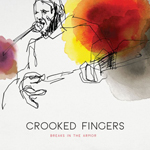|
|
 |
Dusted Reviews
Artist: Crooked Fingers Album: Breaks in the Armor Label: Merge Review date: Oct. 26, 2011 |

|
|
|
 |
Eric Bachmann returns to Merge with Breaks in the Armor, after self-releasing Crooked Fingers’s 2008 Forfeit/Fortune. Breaks is a lower-key, more pared-down effort than Forfeit/Fortune or its Merge-released predecessors, Red Devil Dawn and the underrated Dignity and Shame. Gone are the horn sections and overarching themes, replaced by a basic guitar-drums-bass line-up and a loose-knit collection of songs. That said, it’s hardly an austere affair, and boasts arrangements as carefully layered and calibrated as those on his past albums. Bachmann’s back-to-basics approach is hardly a major break with the past, but makes two things about his songwriting clearer than ever: First, his strength lies in pop, and second, that he tends to think in terms of single songs rather than albums.
These two things, of course, go together. What makes Bachmann such a successful pop songwriter is not only his talent for memorable melodies and punchy arrangements, but also his ability to construct songs as complete, stand-alone pieces of music. Breaks‘s “Typhoon” and “Went to the City” provide two strong examples: Each starts off quiet and understand, builds slowly by layering on more instruments and melody lines, and comes to an emotional climax that deploys multi-layered vocals (both Bachmann’s and those of Liz Durrett). Like Brian Wilson’s symphonies to God, Bachmann’s songs pack a potent emotional wallop into just a few perfectly calibrated minutes. This tendency to stake so much on single songs explains the fact that Bachmann tends to get more critical and fan attention for single songs than for complete albums. That said, he’s never made a bad album.
As usual, Crooker Fingers’ densest, most high-energy tracks are the best. Bachmann works better in an unrestrained, all-out mode than an understated one, on one hand because he’s so good at crafting dense arrangements, but also because his emotional range better suits extroverted expression than private conversations with himself. His belting on the rowdy, distortion-laden “Bad Blood” seems far more natural and effective than the introverted solo guitar and voice of “The Hatchet.” At his quieter moments, Bachmann risks his own individuality, as he seems to more closely emulate those whose influence he wears on his sleeve. Even in these cases though, as on “Heavy Hours,” Bachmann can deliver rather derivative material (which evokes the usual suspects — Dylan, Springsteen, Cohen) convincingly and compellingly enough to negate any demand for something more original or unique.
The same argument applies to his range. Breaks in the Armor may, with a few slight tweaks, find Bachmann doing more or less the same thing as he’s done on his past few albums, but when he does it this well, there’s little reason to object.
By Michael Cramer
|







